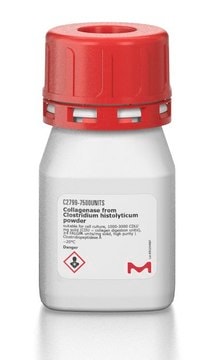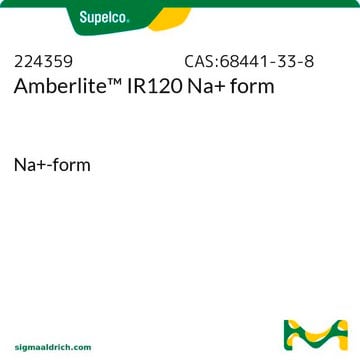C2399
Collagenase from Clostridium histolyticum
0.2 μm filtered, high purity, purified by chromatography, Type VII-S, ≥4 FALGPA units/mg solid, ≥700 CDU/mg solid (CDU = collagen digestion units)
Synonym(s):
Clostridiopeptidase A
About This Item
Recommended Products
Quality Level
sterility
0.2 μm filtered
form
lyophilized powder
specific activity
≥4 FALGPA units/mg solid
≥700 CDU/mg solid (CDU = collagen digestion units)
purified by
chromatography
solubility
TESCA buffer (50 mM TES, 0.36 mM Calcium chloride, pH 7.4): soluble 0.05-0.1 mg/mL at 37 °C
storage temp.
−20°C
Looking for similar products? Visit Product Comparison Guide
Application
- to induce intracerebral hemorrhage (ICH) in mice
- to digest collagen 3D gels for immunofluorescence
- to cause focal blood extravasation and hemorrhage in mouse
Biochem/physiol Actions
Unit Definition
Preparation Note
substrate
Signal Word
Danger
Hazard Statements
Precautionary Statements
Hazard Classifications
Eye Irrit. 2 - Resp. Sens. 1 - Skin Irrit. 2 - STOT SE 3
Target Organs
Respiratory system
Storage Class Code
11 - Combustible Solids
WGK
WGK 1
Flash Point(F)
Not applicable
Flash Point(C)
Not applicable
Personal Protective Equipment
Certificates of Analysis (COA)
Search for Certificates of Analysis (COA) by entering the products Lot/Batch Number. Lot and Batch Numbers can be found on a product’s label following the words ‘Lot’ or ‘Batch’.
Already Own This Product?
Find documentation for the products that you have recently purchased in the Document Library.
Customers Also Viewed
Protocols
To measure collagenase activity, N-(3-[2-Furyl]acryloyl)-Leu-Gly-Pro-Ala is used in a continuous spectrophotometric rate determination at 345 nm. Collagenase hydrolyzes collagen peptide bonds.
To measure collagenase activity, N-(3-[2-Furyl]acryloyl)-Leu-Gly-Pro-Ala is used in a continuous spectrophotometric rate determination at 345 nm. Collagenase hydrolyzes collagen peptide bonds.
To measure collagenase activity, N-(3-[2-Furyl]acryloyl)-Leu-Gly-Pro-Ala is used in a continuous spectrophotometric rate determination at 345 nm. Collagenase hydrolyzes collagen peptide bonds.
To measure collagenase activity, N-(3-[2-Furyl]acryloyl)-Leu-Gly-Pro-Ala is used in a continuous spectrophotometric rate determination at 345 nm. Collagenase hydrolyzes collagen peptide bonds.
Our team of scientists has experience in all areas of research including Life Science, Material Science, Chemical Synthesis, Chromatography, Analytical and many others.
Contact Technical Service







